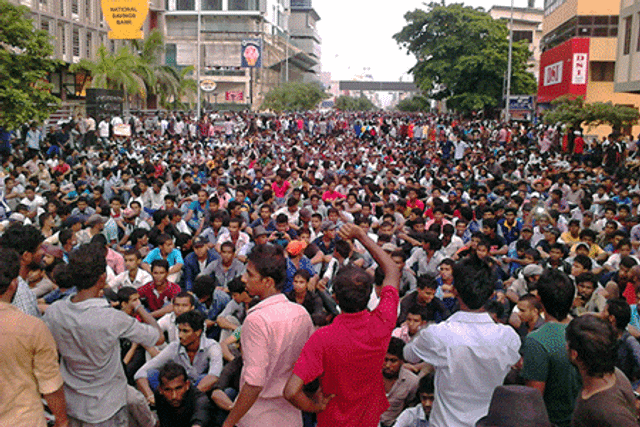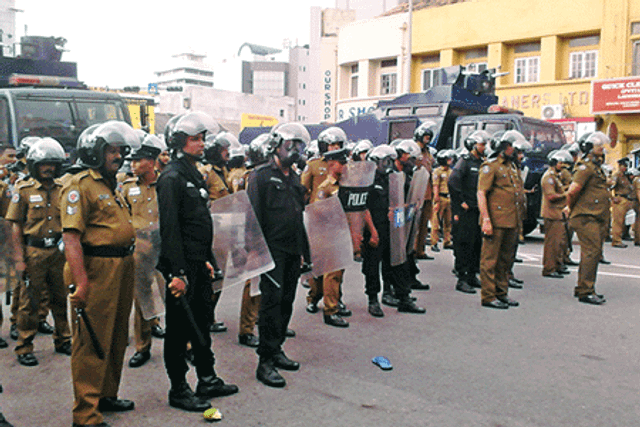Pradeep Ramanayake
Sri Lankan police brutally assaulted university students marching to Prime Minister Ranil Wickremesinghe’s office in central Colombo on Tuesday. Riot police used tear gas and water cannon against the students who were planning to present a list of demands. Five students were injured and five others were arrested. Police were later forced to release those arrested after students staged a sit-down protest on the main Galle Road.
 Students demonstrate in central Colombo
Students demonstrate in central Colombo
Thousands of students marched eight kilometres from Jayawardenepura University to central Colombo. Their 14 demands included the payment of promised increases in Mahapola student loans, the withdrawal of new fee regulations for school education, the abolition of private universities and the withdrawal of increased Open University course fees. The protest was organised by the Inter University Students’ Federation (IUSF), which is controlled by the fake-left Frontline Socialist Party (FSP), a split off from the Sinhala communalist Janatha Vimukthi Peramuna (JVP).
It was the first police attack on students since President Maithripala Sirisena won office in January. Sirisena promised to end the “dictatorial rule” of former President Mahinda Rajapakse and to guarantee democratic rights.
Prime Minister Ranil Wickremesinghe’s office released a statement about the police assault. Hypocritically it declared that the “occurrence of such an unfortunate situation is regrettable” but then attempted to justify the attack. “If the protesters had peacefully allowed their representatives to reach the Prime Minister’s Office such a situation would have not arisen,” it declared.
The immediate cause of the students’ outrage was the government’s failure to increase Mahapola student loans. The Sirisena government promised to lift the interest free loans from 2,500 rupees (about $US19) to 4,000 rupees. Sirisena’s election manifesto promised to raise the loan to 5,000 rupees. In February, the Jayawardenepura University student welfare department even named the students who would receive the increased loan. The university administration, however, unilaterally reversed this decision.
 Police deployed to attack students
Police deployed to attack students
Sirisena and the United National Party (UNP) also promised during the election to increase public employees’ salaries by 10,000 rupees in two instalments but have since reduced the promised wage rise and changed it to an allowance.
The new government has also attacked public education by imposing a new system of levying school fees. Under the cover of preventing corruption, it has cracked down on school administrations that have been forced to collect resources from parents because of inadequate government funding. A circular entitled “prohibition of informal money collection in schools” has now formalised these collections, effectively ending free public education.
Last year, the Rajapakse government dramatically raised Open University student fees to 60,000 rupees. The students have been protesting for the past three months to demand withdrawal of the increase. Sri Lankan university students lack properly-equipped lecture halls and rooms, labs, libraries, lecturers, research opportunities and hostel facilities.
The former Rajapakse government suppressed student opposition by abolishing studentships, suspending classes and mobilising police to assault and arrest protesting students. In line with plans to impose new austerity measures against working people, the Sirisena and UNP-led coalition government is using similar repressive measures.
The International Monetary Fund (IMF) recently refused a request from the Sirisena government for a $4 billion loan. It demanded that the government fulfil pledges made by the previous government to reduce its budget deficit to 4.4 percent of gross domestic product this year and to 3.8 percent of GDP by 2016. The IMF has also called for the further privatisation of state-owned enterprises.
While Sirisena and the UNP-led government face a new general election in June, this week’s attack on students demonstrates that it will not hesitate to crack down on any resistance to austerity measures by workers, the poor and young people.
The ongoing student protests are an indication of a growing anger and militancy. While Tuesday’s march showed students’ determination to fight the government’s cuts to public education, it also exposed the bankrupt program of the IUSF leadership, who are desperately claiming that the new government can be pressured to change course.
During the presidential election, the IUSF leadership, including its convener Najith Indika, gave back-handed support to Sirisena’s campaign. The IUSF organised meetings of university academics who vociferously backed Sirisena. Immediately after Sirisena was elected, Indika sent him a letter imploring, “We expect at least some democratic reforms under your temporary government.”
Contrary to the IUSF’s appeals, the Sirisena government, which is driven by the demands of the international banks and the intensifying crisis of global capitalism, will intensify its assault on public education, health and other vital social programs and basic democratic rights. This can only be fought by mobilising students, workers and the poor on the basis of the socialist and internationalist program advanced by the International Youth and Students for Social Equality and the Socialist Equality Party.
No comments:
Post a Comment